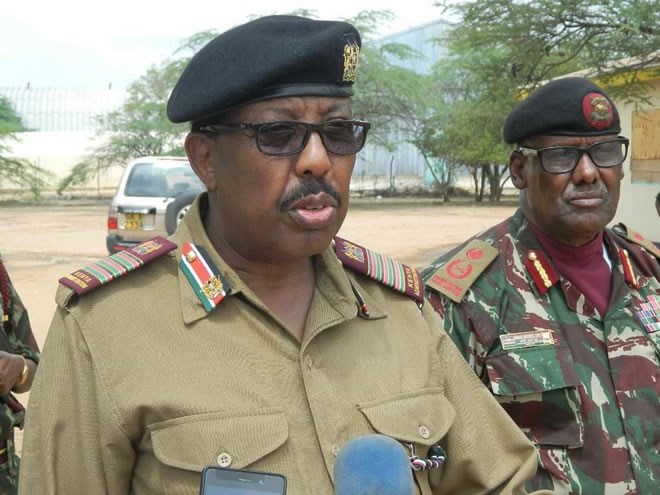
Saturday July 28, 2018
Stephen Astariko

Northeastern regional commissioner Mohamud Saleh speaking to the press after a meeting with his security team and elders and elected leaders from the 3 constituencies over boundary dispute.with his is the regional AP Boss Omar Shurie.
The national government will revert to the old boundaries of three constituencies within Wajir to end disputes and bloodshed.
The boundaries will be restored to where they were before the 2013 General Election.
The government on Friday asked leaders in Eldas, Wajir North and Wajir West to stop misleading residents about boundary disputes that have left at least 135 people dead in five years.
The disputed boundary between Eldas and Wajir North has claimed 127 lives. Wrangles pitting Eldas and Wajir West have left at least 10 people dead.
Northeastern regional commissioner Mohamud Saleh and his security team on Friday met elders and elected leaders from the three constituencies. He produced a map clearly showing where the boundaries were before the 2013 General Election.
He said boundaries will revert to administrative boundaries that created the three constituencies before those polls.
During the meeting at the residence of county commissioner Lyford Kibaara — where no one was allowed to ask questions, applaud or comment — Saleh explained in detail how the three constituencies were created by the Electoral Commission of Kenya (ECK) in 2010.
Wajir North constituency was carved out of Wajir West constituency in 1995 by the ECK. Eldas was carved out of Wajir West shortly before the 2013 General Election by the Independent Electoral and Boundaries Commissioin.
The boundaries that were created after Eldas was carved out of Wajir West will remain as they are.
Political observers say Eldas constituency is trying to expand by extending its boundaries into Wajir West and North.
Saleh told elders and leaders to stop misleading wananchi by confusing them about the administrative and electoral boundaries.
He said residents, especially the pastoral communities, are less concerned with boundaries as they crisscross them in search of pasture and water for their livestock.
Saleh said the government was forced to step in and take a final position after the elders, elected leaders and the clergy failed to agree on the boundaries.
He said, however, because the electoral boundaries are reviewed by the IEBC every 10 years, the government will support any changes that is agreed between the parties in the disputed boundaries.
“When I was instructed by the President to resolve the border dispute in 2016, I retrieved information from the IEBC, survey maps and other documents that guided me and my team in arriving at this report,” Saleh said.
He said they sat down with experts and came up with a report based on the documents. “We believe it is fair, just and will go a long way in ending these disputes. The county commissioner has instructions to fully implement it,” Saleh said.
He warned that firm action will be taken against leaders who incite communities. Saleh said all IDPs who fled their homes at the disputed border areas will be resettled.